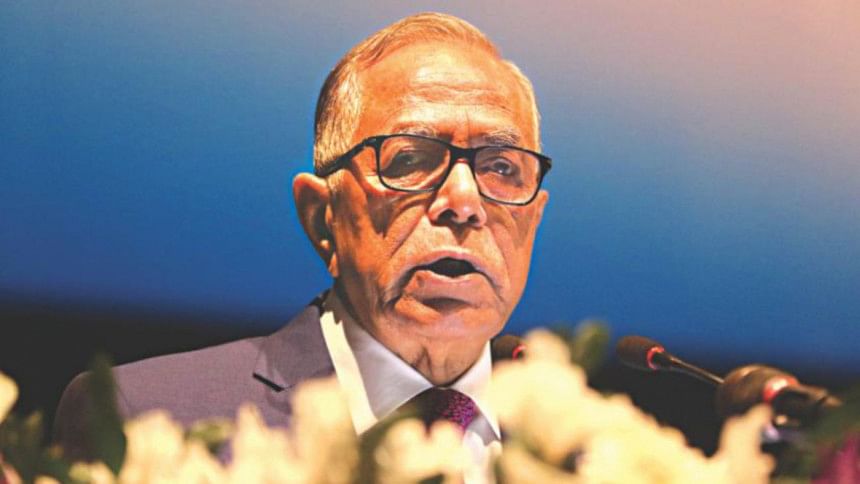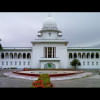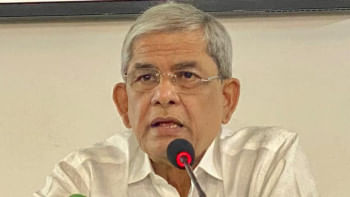The RPO and the president's role

Surprising as it may seem to many, President Abdul Hamid has legal authority to play a significant role in ensuring that the next parliamentary election is held in a free and fair manner. The electoral law offers him with the special power to issue directives upon the government to provide the Election Commission with necessary assistance for holding a free and fair election.
Let's look at a quote of a relevant section of the Representation of the People Order, 1972 to see what power the president has—which remains little known to many of us. Section 5(2) of the RPO reads: "All executive authorities of the Government shall assist the Commission in the performance of its functions, and for this purpose the President may, after consultation with the Commission, issue such directions as he may consider necessary."
The most significant thing in this section is that the president neither needs to consult with the government nor seek advice from the prime minister to issue any such directives which he does in almost all other instances save two. Usually, according to the constitution, the president performs all of his functions, except the appointment of the prime minister and the chief justice, on the advice of the prime minister. But the electoral law says something different. He may consult with the EC to know its requirements before issuing directives upon the government authorities.
The RPO provision has been made in light of article 126 of the constitution that reads: "It shall be the duty of all executive authorities to assist the Election Commission in the discharge of its functions."
What are the functions of the EC? Article 119 (1) of the constitution says: "The superintendence, direction and control of the preparation of the electoral rolls for elections to the office of President and to Parliament and the conduct of such elections shall vest in the Election Commission which shall, in accordance with this Constitution and any other law, (a) hold elections to the office of President; (b) hold elections of members of Parliament; (c) delimit the constituencies for the purpose of elections to Parliament; and (d) prepare electoral rolls for the purpose of elections to the office of President and to Parliament."
On the significance of article 119, the Supreme Court in the 13th Amendment case verdict observes: "The opening words used in Article 119 to the effect that the superintendence, direction and control of the preparation of the electoral rolls for all elections manifestly suggest that the Election Commission is vested with all powers for holding 'free and fair' elections of members of parliament."
In the verdict that declared the caretaker government system unconstitutional, the apex court further states: "The objective of setting up of an Election Commission is to achieve a free and fair election being conducted by an independent body. The Constitution-makers entrusted the task for conducting elections upon the Election Commission and not upon the executive Government for transacting the business of holding a free and fair election."
But the way the current EC is functioning to ensure equal opportunity for all political parties has raised questions whether a free and fair election is possible under the current conditions. Claiming that a congenial atmosphere for polls exists across the country, the chief election commissioner on November 8 announced the election schedule. He pledged that the EC would take measures to ensure equal opportunity for all political parties and the candidates. He also promised that he would issue stern orders to the law enforcement agencies not to harass opposition men and file "false" cases against them. But as of now, the EC has not issued any such directives. The law enforcement agencies continued to file cases against opposition men and arrest them in different parts of the country even after the announcement of the schedule.
If the CEC had issued directives in line with his pledges, things could have improved to some extent. And the government is under obligation to assist the EC in discharging its functions.
It is the duty of the EC to assess the situation and see whether it is in favour of holding a free and fair election. If, in its assessment, it finds that a congenial atmosphere does not exist, it needs to take necessary steps and either seek assistance from the government departments or order them to take measures required to ensure a congenial atmosphere for holding free and fair polls.
It is the constitutional obligation of the CEC and his colleagues in the EC to uphold the dignity of the high constitutional office they hold by performing their functions without fear or favour. The constitution and the electoral law both provide them with unlimited powers to exercise for the sake of holding the election in a free and fair manner. The framers of our constitution had rightly focused on setting up a strong EC as they dreamt of a democratic state in which the EC would play a significant role. The EC's constitutional obligation is to hold elections which are the lifeblood of any democracy. Those who are now leading the EC need to keep this in mind—they are bound by their oath to uphold the constitution.
Thus the little known provision of the electoral law—section 5(2) of the RPO—that provides the president with significant powers during the election should be kept in mind by the EC in conducting the upcoming parliamentary polls.
Shakhawat Liton is Planning Editor, The Daily Star.










Comments